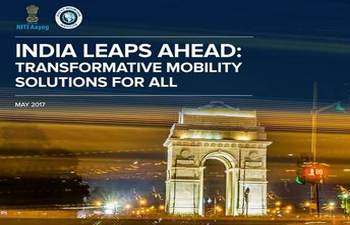Reports

Feebates—market-based, revenue-neutral, and size-neutral—can act as an important policy lever in support of India’s “leapfrog” vision of an electric, shared, and connected mobility system by incentivizing the production and use of clean vehicles, according to a new report.
Accelerating Bangalore’s Mobility Transition
2020
Author(s): Rocky Mountain Institute, RMI India, Micelio
Cities across India are witnessing rapid urbanization and growing mobility demand. Developing and deploying shared, clean, and citizen-centric mobility solutions will be critical to ensure this demand is met in a sustainable manner that provides safe, accessible, and reliable transportation for citizens.
RMI’s report Reducing EV Charging Infrastructure Costs finds that the electric vehicle (EV) charging industry needs to do what the solar industry did about a decade ago: streamline and de-bottleneck installation.
In this first-of-its-kind study for the Colorado Energy Office, RMI performed a comparative analysis of three proposed tariffs that are specifically designed to meet the needs of the unique type of load presented by DC fast chargers (DCFCs) for electric vehicles.
In this report, RMI evaluates how mobility ecosystems are evolving in three fast-changing markets: China, India, and the United States.
Rocky Mountain Institute worked with Seattle City Light to develop the first comprehensive transportation electrification strategy for a municipal utility, looking across all market segments—personally owned vehicles, trucks, buses, and shared mobility.
Ushering In New Mobility With User-Centered Design
2019
Author(s): Crow A, Daniels L, Klock-McCook Edward J.
Three core new-mobility technologies—autonomy, shared ride platforms, and electric powertrains—offer the promise of cheaper, cleaner, safer mobility for everyone, and are advancing by the minute.
With support from the Robert Wood Johnson Foundation, RMI is exploring and testing industry interest in a concept we’re calling MOD Cities, where “MOD” is short for “modular” and “modifiable” and also stands for “mobility-oriented development.”
With support from the Robert Wood Johnson Foundation, RMI’s Mobility-Oriented Development team has been experimenting at the interface of personal mobility and urban design to develop a practical and scalable approach to reducing emissions, enhancing health, and improving equity in cities.
The Carbon-Free Regions Handbook
2018
Author(s): Corvidae J, Stone L, Jungclaus M, Mandel J, Whitney A, Bronski P
The Carbon-Free Regions Handbook helps state, provincial, and regional governments implement policies and actions that place their communities on an aggressive path toward sustainable, low-carbon economies.



